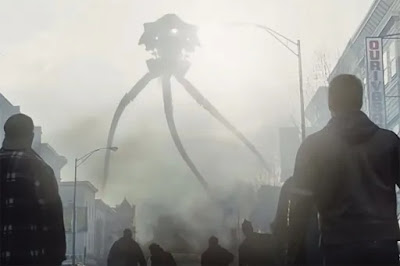Though it begins with Morgan Freeman reciting narration from Wells’s text, the “infinite complacency” he references assumes a different tone taken in tandem with the ensuing shot of the World Trade Center-less Manhattan skyline seen from a Red Hook dockyard across the way, subtly imprinting in our minds the overriding sense of what was lost four years earlier. Our shepherd through this valley of darkness becomes Tom Cruise, playing a crane operator named Ray Ferrier, introduced grinning and swaggering, a cowboy with a Yankees cap, but one who quickly gets cut down to size upon returning home to find his ex-wife Mary Ann (Miranda Otto) and two kids, 10-year-old Rachel (Dakota Fanning) and teenage Robbie (Justin Chatwin), waiting for him. “Didn’t we say eight-thirty?” he asks in such a way to let you know that, no, they definitely did not say that. Mary Ann is lit to look like an angel and takes herself on an uninvited tour of Ray’s house where she finds spoiled milk in the refrigerator and a car engine on the kitchen table, establishing a father who can barely care for his kids. Indeed, he doesn’t seem to know Rachel is allergic to peanut butter and a game of catch with Robbie is like “Field of Dreams” turned inside-out.
He will have to become a good father, of course, graduating to that status through the crucible of an alien invasion, though the tone is less heartwarming than horrifying, opting for pure survival mode over sentimentality, evoked in the movie’s nigh bewildering speed. From the moment the first alien tripod emerges from within the earth and goes about destroying Ray’s neighborhood, the pace mirrors the ferociously roving camera, tightly choreographed to transmit chaos, the whole world seeming to spin out of control around Ray as he seeks to get back to his kids and then to get his kids to safety, relentless forward moment comprised of one close encounter after another, the characters trying to make sense of what’s going on without the usual TV broadcast trappings to guide them (save for one conspicuous sequence involving a news van that I desperately wish had slid its door shut to reveal something like Acme Exposition Media painted on the outside). When they finally find a safe haven and Ray plops down in a chair to close his eyes, you feel the weight momentarily fall off his shoulders, even if that shot quickly gives way to one of Ray literally re-opening his eyes to a new moment of impending terror, life as an unceasing nightmare.
Though Spielberg injects his rollercoaster with some more straightforward allusions to humanity’s wicked impulses in the face of dire events, like a mob descending on the Ferrier car, he makes room for more cunning metaphors too. The image of a tripod through the dropped viewfinder of a camcorder is not just a cool shot but a manifestation of our obsession with documenting reality, and death and destruction most specifically, a moment tied to a preceding one in which Ray eschews safety to have a look at the otherworldly machine, staring up at it dumbly, effusing the look of a man who just can’t help himself. One of his friends trying to call him back by saying “Don’t go” foreshadows a later moment when Ray says the exact same thing to his son when he becomes desperate to ascend a nearby hill where the U.S. military is unsuccessfully trying to repel the alien attack. Finally, Ray relents, and Robbie vanishes from view just as massive explosions rock the landscape. I remember dismissing this moment when I first saw the movie as overwrought, or maybe absurd, but this time around no moment hit me more. Not the father letting his son go so much as the gruesome spectacle carrying Robbie away, the inescapable instinct to look our doom right in the eye.
It is also the moment when “War of the Worlds” falls apart not. If Spielberg’s version seems to be forging its own path, it veers, honoring the novel’s own conclusion but in a manner that feels so rushed it plays more like a deus ex machina while Robbie re-appears at the end, not for a game of catch but close enough, a movie marching straight into the darkness suddenly taking a disorienting off ramp to the light.





No comments:
Post a Comment